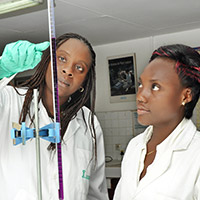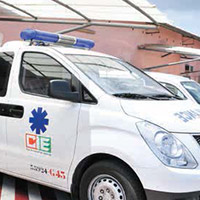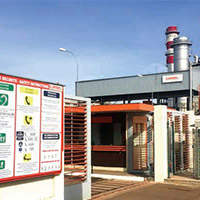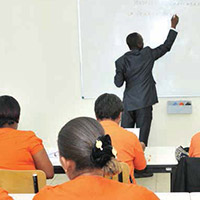The Eranove group's commitments
Encouraging fair, stable employment
In keeping with national and international laws, the Eranove group supports local recruitment and stable employment, fights against discrimination, motivates performance, prioritises the employment of young people and encourages social dialogue.














Protecting our employees with social protection
Inspired by traditional African values of solidarity, the Eranove group set up a social policy from the very beginning, guaranteeing a calm environment and making connections of solidarity between employees. This policy is based on several procedures, regarding solidarity, health, retirement and social finance.
The Eranove group’s employees all benefit from health insurance from the start of their contract, and with CIE and SODECI this insurance is continued for retired agents until the end of their life as well as for their families. Social security procedures are also put in place, according to each company’s particularities.
Increasing health and safety at work
The mechanisms that have been put in place to ensure the safety and the health of employees as they carry out their work are generally based on the health and safety procedures of the OHSAS 18001 or ISO 45001 standard, as well as the prevention measures put in place by the Health, Safety and Working Conditions Committees (CHSCT), manager safety and environment inspections (VHSE) and safety meetings. The QSE coordinator and the CHSCT members monitor and ensure that working conditions and safety measures conform to the relevant regulations and to the group’s social ambitions.













Investing in training
In 2018, the Eranove group continued to play a role in catalysing the mosaic of pan-African expertise, based on a firm belief that human skill is the key to success. The group has been investing in training for a long time, through its subsidiaries’ training programmes. An example of this approach is the Centre for Electricity Jobs (CME), which is run by the CIE (an Eranove group subsidiary). Created in 1970, it is now at the centre of our strategy for investing in training.
The Eranove group’s actions are focussed on job-based skills, with the intention of matching human resources to appropriate posts.

In CIE, the safety culture also extends to sub-contractors and outsiders.
As an electrician, professionalism goes hand in hand with the elimination of electricity-related accidents. In order to achieve this goal, in 2011 CIE began a long-term action plan that targeted employees, but also subcontracting companies and residents who live near the power lines.
For employees, the action plan centres on three main areas:
- Employee training in electrical risk (providing all the electricians with an employee instruction booklet (CPP)), consignation (voltage-free work), and, within the framework of the recent CME (Centre for Electricity Jobs) SERECT1 accreditation, both high and low voltage work. Electrical authorisations are also issued and assessed in order to avoid confusion regarding roles.
- Employee protection, providing them with appropriate Personal Protective Equipment (EPI) (helmets with face masks, composite gloves…) and specialist toolboxes that are regularly updated.
- Management involvement, as reflected by the inclusion of the organisation of Manager Safety Inspections in managers’ goals (1755 visits carried out in 2017, compared to an average of 1000 since 2015), the systematic analysis of accidents and a daily presentation by the Safety Prevention Engineers (IPS).

For subcontractors, the goal is to encourage companies to move towards the same safety standards that apply to CIE employees, using an improved accreditation system. The emphasis is on training companies in the access regulations for the distribution network and the provision of appropriate EPI.
Finally, for outsiders, CIE’s work consists of raising employee awareness of the need to quickly eliminate risks for residents, distributing information to customers about electrical risks and organising awareness sessions for the general public: pupils, students, press, authorities, traditional leaders, pharmacists…
This work is reflected in the figures from 2017:
- Among employees: no member of staff involved in an electricity-related accident (compared with an average of 6 in the last 5 years),
- Among subcontracting companies: 3 accidents, none of them fatal (compared with 3 accidents, of which 2 were fatal, in 2016),
- Among outsiders: a reduction in accidents – 25 accidents (19 fatal) compared with 35 (26 fatal) in 2016 across the country.
CIE’s goal is to eliminate electricity-related accidents for employees, subcontracting companies and outsiders by 2020.
1-The Technical Committee’s Research, Implementation and Experimentation Department





